-
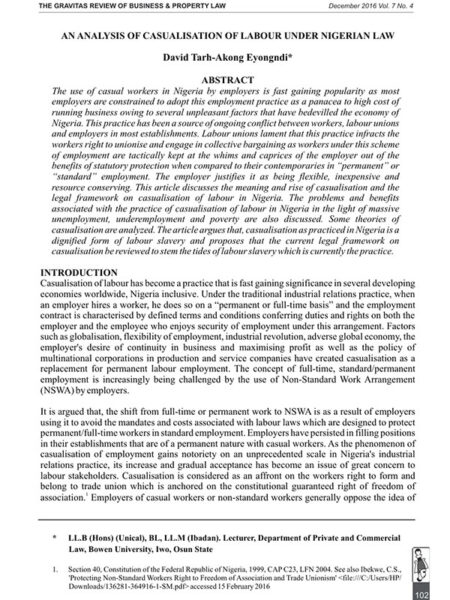
An Analysis of Casualisation of Labour under Nigerian Law
0₦2,500.00David Eyongndi of the Faculty of Law, Bowen University, Iwo, Osun State in his article, “An Analysis of Casualisation of Labour Under Nigerian Law” examines the use of Non-Standard Work Arrangement (NSWA) otherwise called ‘Casual Labour’ in Nigeria. He considers the rise, causes, effects and legal framework on casualisation. He argues that NSWA may not be as bad as it first seems, as it serves as a springboard for some workers to acquire necessary skills and experience to improve their permanent employability prospects. He recommends a regulation of the practice for the benefit of all stakeholders.
-
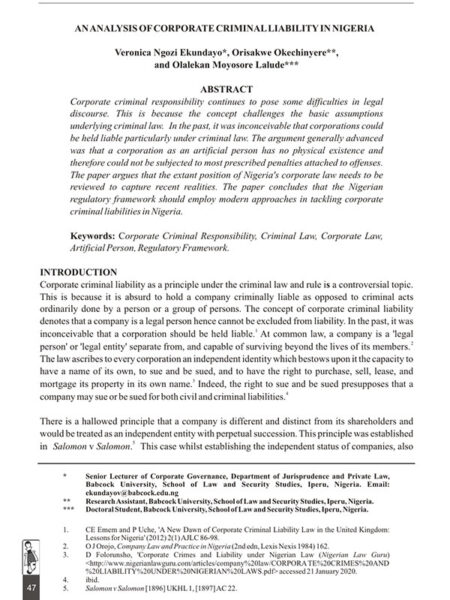
An Analysis of Corporate Criminal Liability in Nigeria
0₦2,500.00Veronica Ekundayo, Orisakwe Okechinyere, and Olalekan Lalude all of the Babcock University, School of Law and Security Studies Iperu Nigeria, in their article An Analysis of Corporate Criminal Liability in Nigeria, examine the concept and jurisprudential underpinnings of corporate criminal liability. They explore Nigerian criminal statutes providing for liability of companies for criminal infractions. They also consider judicial attitude to corporate criminal liability in Nigeria, the practice in other jurisdictions and conclude that the Nigerian regulatory framework should employ modern approaches in tackling corporate criminal liability in the country.
-
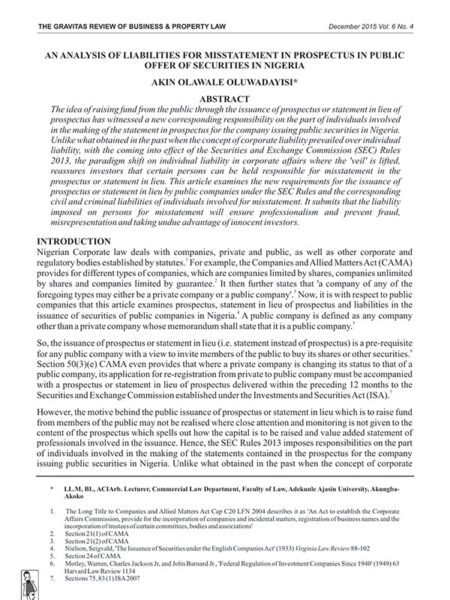
An Analysis of Liabilities for Misstatement in Prospectus in Public Offer for Securities in Nigeria
0₦2,500.00Akin Oluwadayisi, Lecturer, Commercial Law Department, Adekunle Ajasin University, Akungba-Akoko in “An Analysis of Liabilities for misstatement in Prospectus in Public Offer of Securities in Nigeria” discusses the liability of officers of a company and professionals for untrue statements in Prospectus in public offer of securities. He argues that individual liability now provided for by regulations is necessary to ensure professionalism and prevent fraud and abuse.
-
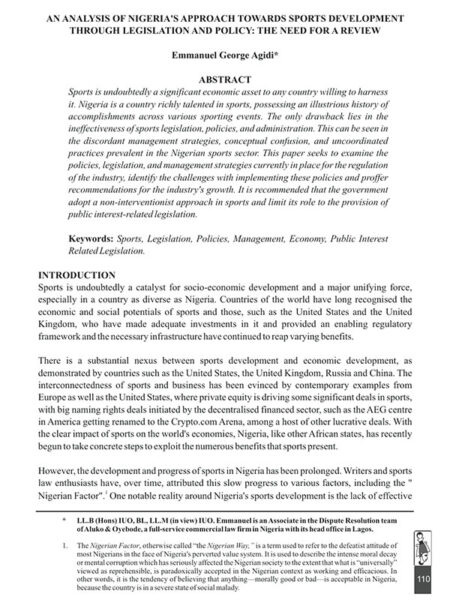
An Analysis of Nigeria’s Approach Towards Sports Development Through Legislation and Policy: The Need for a Review
0₦2,500.00Emmanuel Agidi, Associate at Aluko & Oyebode, in his article, An Analysis of Nigeria’s Approach Towards Sports Development Through Legislation and Policy: The Need for a Review, notes that Sports is, without doubt, a major economic asset to any country willing to harness it. Nigeria is richly talented in sports, possessing an illustrious history of accomplishments across various sporting events. The only drawback lies in the ineffectiveness of sports legislation, policies, and administration. This can be seen in the discordant management strategies, conceptual confusion, and uncoordinated practices prevalent in the Nigerian sports sector. Agidi examines the policies, legislation, and management strategies currently in place for regulating the sports industry in Nigeria identifying the challenges with implementing these policies, and proffers recommendations for the industry’s growth.
-
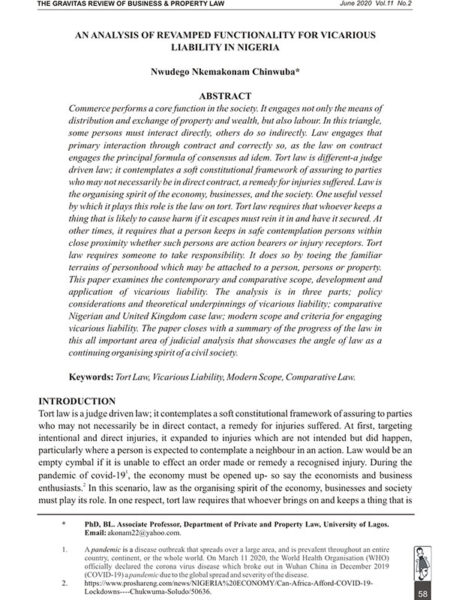
An Analysis of Revamped Functionality for Vicarious Liability in Nigeria
0₦2,500.00Dr Chinwuba Nwudego, Associate Professor of Law University of Lagos Akoka Nigeria in her article, An Analysis of Revamped Functionality for Vicarious Liability in Nigeria, observes that Tort Law, a judge driven law, contemplates a soft constitutional framework of assuring to parties who may not necessarily be in direct contract, a remedy for injuries suffered. She examines the contemporary and comparative scope, development and application of vicarious liability in Nigeria and the United Kingdom. She further explores the policy and theoretical basis, and the modern scope and criteria for engaging vicarious liability. She summarises the progress of the law in this area and shows how it has continued to be the organising spirit of society.
-
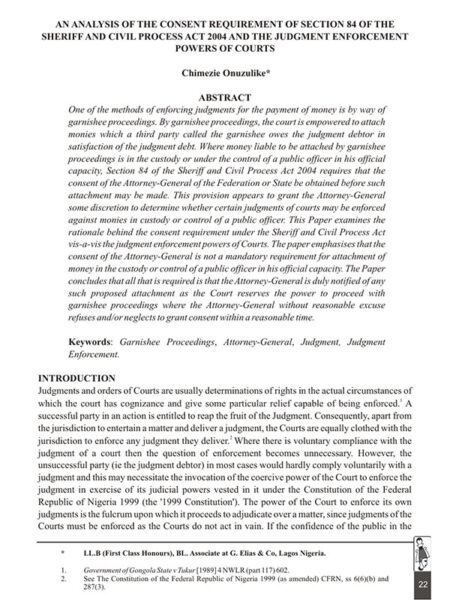
An Analysis of the Consent Requirement of Section 84 of the Sheriff and Civil Process Act 2004 and the Judgement Enforcement Power of Courts
0₦2,500.00Chimezie Onuzulike, Associate at G. Elias & Co in his article An Analysis of the Consent Requirement of Section 84 of the Sheriff and Civil Process Act 2004 and the Judgement Enforcement Power of Courts,notes that where money liable to be attached by garnishee proceedings is in the custody or under the control of a public officer in his official capacity, Section 84 of the Sheriff and Civil Process Act 2004 (SCPA) requires that the consent of the Attorney-General of the Federation or State be obtained before such attachment may be made. This appears to grant the Attorney-General some discretion to determine whether certain judgments of courts may be enforced against monies in custody or control of a public officer. Chimezie examines the rationale behind 84 SCPA vis-a-vis the sacrosanct judgment enforcement powers of the court.
-
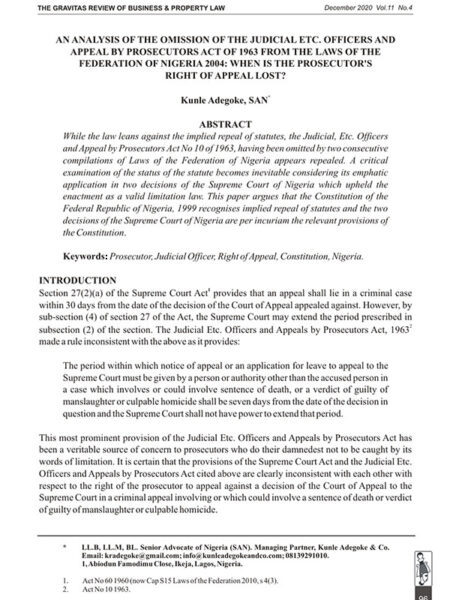
An Analysis of the Omission of the Judicial Etc. Officers and Appeal by Prosecutors Act of 1963 from the LFN 2004: When is the Prosecutor’s Right of Appeal Lost?
0₦2,500.00Kunle Adegoke, Managing Partner Kunle Adegoke & Co. in his article, An Analysis of the Omission of the Judicial Etc. Officers and Appeal by Prosecutors Act of 1963 from the LFN 2004: When is the Prosecutor’s Right of Appeal Lost?, argues that while the law leans against the implied repeal of statutes, the Judicial, Etc. Officers and Appeal by Prosecutors Act No 10 of 1963, having been omitted by two consecutive compilations of Laws of the Federation of Nigeria appears repealed. Adegoke examines the status of the statute against the background of the emphatic application of the statute in two decisions of the Supreme Court, which decisions upheld the enactment as a valid limitation law. Adegoke argues that the Constitution of the Federal Republic of Nigeria 1999 recognises implied repeal of statutes and the two decisions of the Supreme Court are per incuriam the relevant provisions of the Constitution.
-
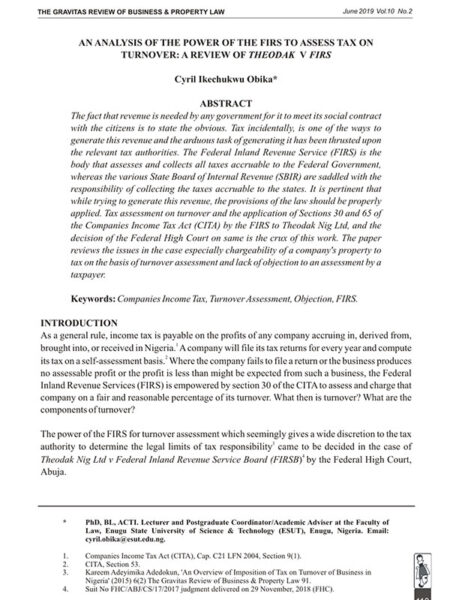
An Analysis of the Power of the FIRS to Assess Tax on Turnover: A Review of Theodak v FIRS
0₦2,500.00Dr Cyril Obika of the Faculty of Law, Enugu State University of Science & Technology, Enugu Nigeria in his article, An Analysis of the Power of the FIRS to Assess Tax on Turnover: A Review of Theodak v FIRS posits that ordinarily the FIRS, under section 9 of the Companies Income Tax Act 1961 as amended (CITA) charges to tax the profits of a company on its income> accruing in, derived from, brought into, or received in Nigeria. Exceptionally, under section 30 CITA the FIRS may charge a ‘fair and reasonable percentage’ of the turnover of a company to tax where there is no assessable profit or the profit is less than expected of such a business. Again, the FIRS under section 65 CITA may use its ‘best of judgment’ to assess tax where a company fails to file a return. Can the property of a company let to tenants be its turnover? Dr Obika examines the interrelation of sections 9, 30 and 65 of the CITA in his review of Theodak v FIRS.
-
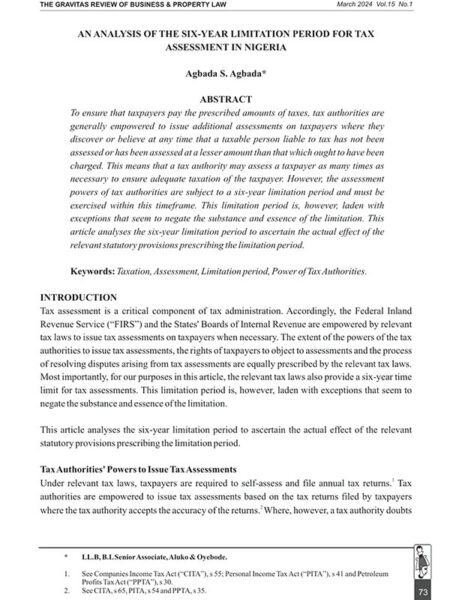
An Analysis of the Six-year Limitation Period for Tax Assessment in Nigeria
0₦2,500.00Agbada S. Agbada, in his article, An Analysis of the Six-year Limitation Period for Tax Assessment in Nigeria, examines the six-year limitation period for tax assessment in Nigeria. To ensure that the prescribed amounts of taxes are paid by taxpayers, tax authorities are generally empowered to issue additional assessments on taxpayers where they discover or are of the opinion at any time that a taxable person liable to tax has not been assessed or has been assessed at a lesser amount than that which ought to have been charged. This means that a tax authority may assess a taxpayer for as many times as may be necessary to ensure an adequate taxation of the taxpayer. However, the assessment powers of tax authorities are subject to a six-year limitation period and are required to be exercised within this timeframe. This limitation period is however laden with exceptions that seem to negate the substance and essence of the limitation. Agbada analyses the six-year limitation period with a view to ascertaining the true effect of the relevant statutory provisions prescribing the limitation period.
-
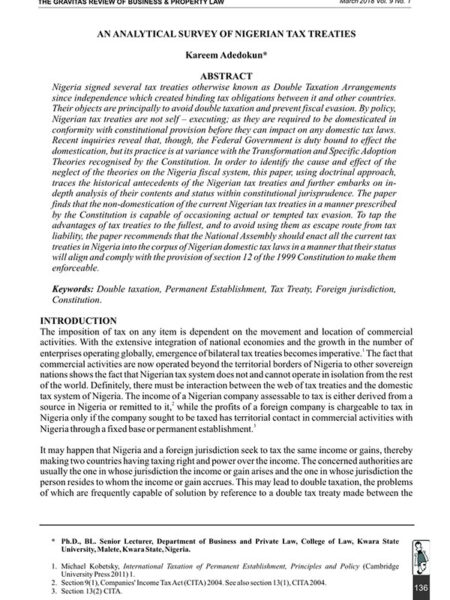
An Analytical Survey of Nigerian Tax Treaties
0₦2,500.00Dr. Kareem Adedokun, Senior Lecturer, Department of Business and Private Law, Kwara State University, in “An Analytical Survey of Nigerian Tax Treaties”,explains that Nigeria has since Independence, signed several tax treaties which created binding tax obligations between it and other countries. The objects of the treaties are principally to avoid double taxation and prevent fiscal evasion. He argues that the non-domestication of the tax treaties in a manner prescribed by the Constitution is capable of occasioning actual or tempted tax evasion. He recommends the domestication of the treaties to take full advantage of them, and to avoid them being used to escape tax liability.
-
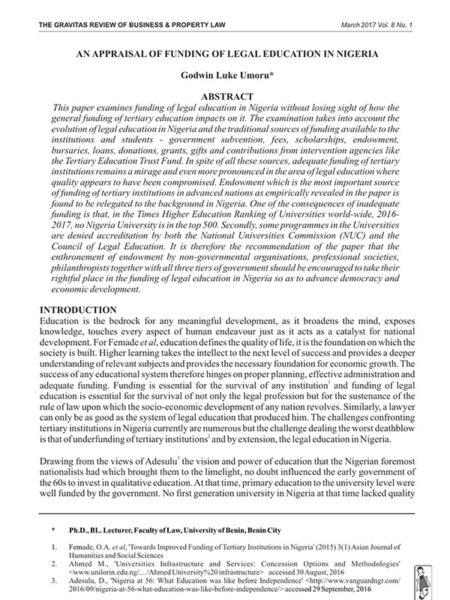
An Appraisal of Funding of Legal Education in Nigeria
0₦2,500.00Dr Godwin Umoru of the Faculty of Law, University of Benin in his article “An Appraisal of Funding of Legal Education in Nigeria” examines the historical trajectory and framework for funding legal education in Nigeria, ranking of Nigerian universities among their African peers, endowment and other options for sustainable funding and development of legal education.
-
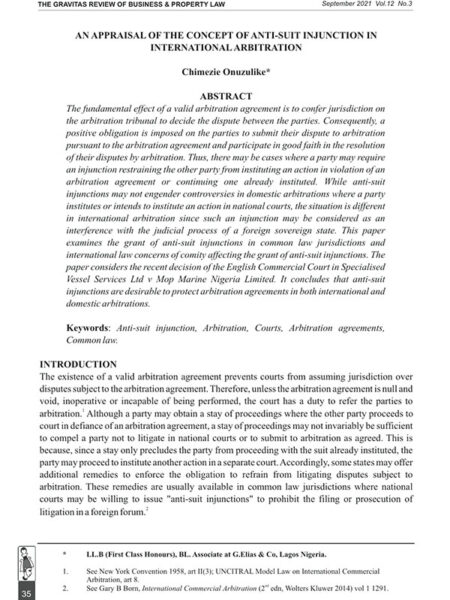
An Appraisal of the Concept of Anti-Suit Injunction in International Arbitration
0₦2,500.00Chimezie Onuzulike, Associate at G. Elias & Co, in his article, An Appraisal of the Concept of Anti-Suit Injunction in International Arbitration, explains that Anti-suit injunctions are orders of national courts usually granted in common law jurisdictions, restraining a party from commencing an action concerning a dispute subject to an arbitration agreement or continuing one already commenced in defiance of an arbitration agreement. He reviews the stance of courts in relation to the grant of anti-suit injunctions. He argues that while anti-suit injunctions may not engender controversies in domestic arbitrations where a party institutes or intends to institute an action in national courts, the situation is different in international arbitration since such an injunction may be considered as an interference with the judicial process of a foreign sovereign state. Chimezie reviews the decision of the English Court in Specialised Vessel Services Ltd v Mop Marine Nigeria Limited and stresses the importance of anti-suit injunctions in protecting arbitration agreements in both international and domestic arbitrations.
The Gravitas Review of Business & Property Law



